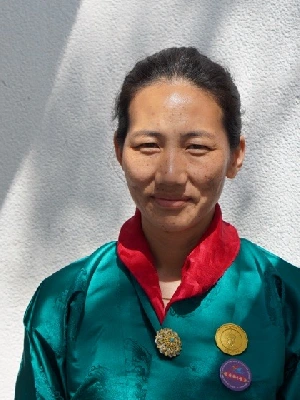Tshering Zangmo
“Excited for Bhutan’s Solar Future"
Tshering Zangmo is the first to admit that before starting her SAR100 journey, she didn’t really know all that much about renewable energy.

“Excited for Bhutan’s Solar Future"
Tshering Zangmo is the first to admit that before starting her SAR100 journey, she didn’t really know all that much about renewable energy.

Tshering Zangmo is the first to admit that before starting her SAR100 journey, she didn’t really know all that much about renewable energy.
"I didn’t have any knowledge and skills about renewable energy, particularly solar and wind. I didn’t know how to integrate renewable energy sources into the power system grid, or how to use software like PSSE, Gunsik, and Matlab," she says.
Working at a power substation back home in Bhutan, Tshering’s role is to look after operations and administration for staff. There’s not a lot of time and space to think deeply about what a sustainable energy transition might look like for her home country, or indeed, the wider South Asian region.
But, thanks to the WePOWER SAR100 training course, that (and more) has changed.
"I got a huge opportunity with SAR100, to gain knowledge – including technical skills – on renewable energy integration in the power system. It’s very important to incorporate these renewable energy sources in order to achieve net zero carbon emissions," Tshering explains.
Running across 2023-2024, the SAR100 course was delivered by the Bangkok-based Asian Institute of Technology (AIT) and made possible through the AU $32 million South Asia Regional Infrastructure Connectivity (SARIC) Program, which is funded by the Australian Government and implemented by Palladium alongside the World Bank and the International Finance Corporation.
Alongside 101 other talented South Asian female engineers from across Bangladesh, Bhutan, India, Maldives, Nepal, Pakistan and Sri Lanka, Tshering completed 10 modules over an 8-month period. Her group project was aptly titled "Accelerating the secure and resilient energy transition in the electricity sector of South Asia".
"Most of the modules were related to renewable energy, and the last module was about women and leadership," says Tshering. "This knowledge can be implemented in my country in the future, especially for solar and wind plants," she adds.
Tshering may be right about that.
Bhutan has been dependent on hydropower for years (even releasing its own Sustainable Hydropower Development Policy in 2021), but in its 2024-25 budget plan, outlined plans to add other renewables into the energy mix including solar and wind. 16 solar projects are planned, which add up to 1,226 megawatts (MW). The biggest of these include 200 MW solar projects in Gelephu and Merak Sakteng. Although still in the feasibility study stage, these projects could signal an exciting future for Bhutan’s energy sector (and exciting opportunities for engineers like Tshering).
"The renewable energy power system was very new to me, but I got the chance to pursue all of these modules, and learn new software. My personal perspective has transformed," she says.
"The course increased my confidence! I will work towards more ambitious goals."